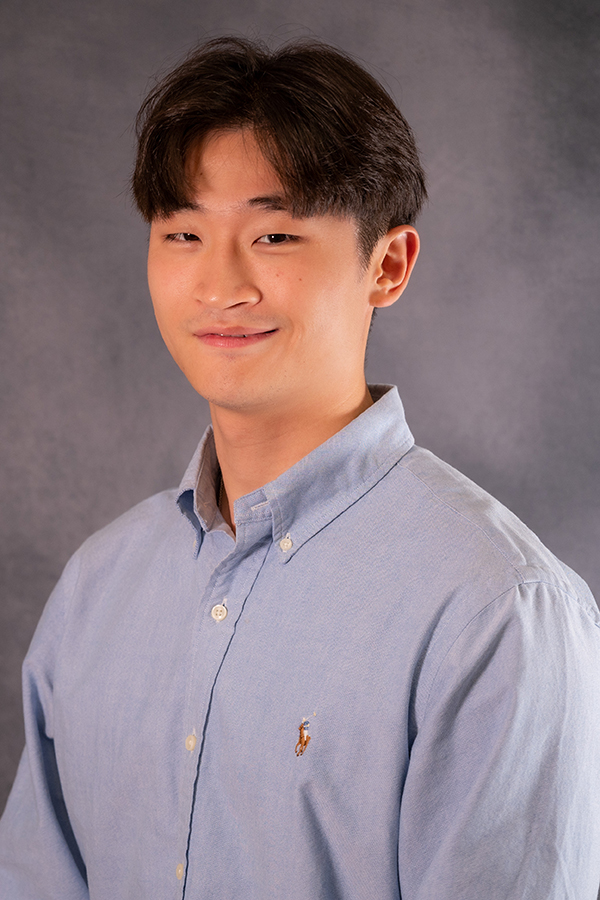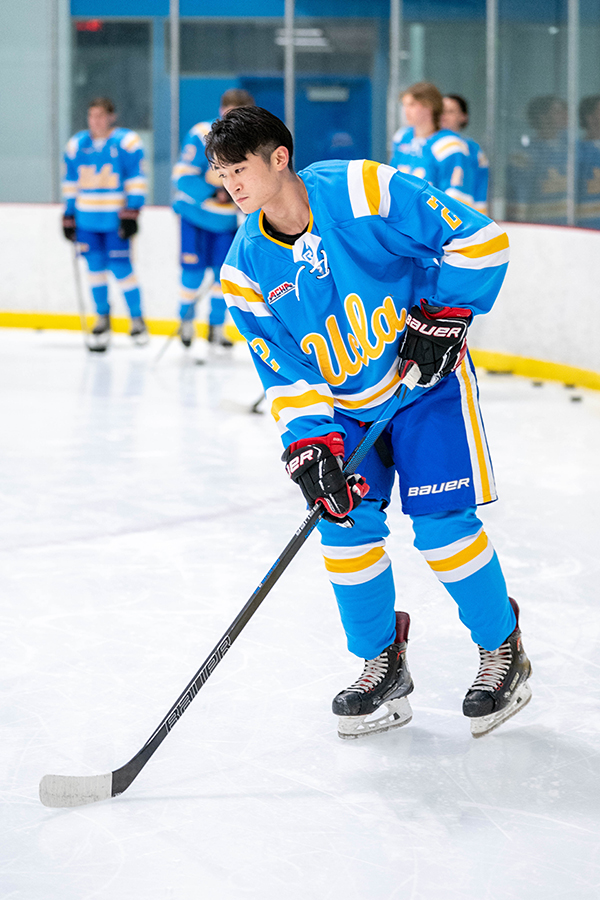Pivoting the Play
Sungwon Lee's Journey from Hockey to Data Analytics
By Amy Pavlak Laird
Media Inquiries- Interim Director of Communications, MCS
- 412-268-9982
Determination. Dedication. Commitment. These traits have served Sungwon "Alex" Lee well throughout his ice hockey career, getting him through long practices, sore muscles and tense overtimes in the playoffs. And they came in clutch when his dreams of playing professional hockey didn't pan out.
The Carnegie Mellon University graduate student started playing hockey when he was 10 years old. He's played in South Korea, Canada and the United States as a forward. His latest team: the Carnegie Mellon club team.
The team includes players with all skill levels, including veteran grad students like Lee, who played games when his schedule allowed.
"We did a pretty good job this season. We made the playoffs but lost the final game," he said.
Lee recently graduated with an M.S. in Data Analytics for Science (MS-DAS). But getting to this point wasn't easy. Lee said being a star hockey player in high school meant that academics weren't a priority. He felt like he had some catching up to do after high school, so he spent his first two years at a community college in California, where his aunt lived. There, he took basic math classes like trigonometry and precalculus. The more math classes he took, the more he realized that he really liked solving math problems. He transferred to UCLA and majored in statistics.
At the time, data science was experiencing a boom, and Lee was hooked. He soon added a dual major in data science.
"I was like, this is what I want to really do: neural networks, deep learning, machine learning," he said. "If I look back at everything that happened, I'm actually thankful because I feel like I have more knowledge and abilities and confidence."
He put that knowledge to good use. While at UCLA, Lee played for the university's hockey club team. Lee noticed that his team's scoring rate was low even though they had great players, and he was determined to figure out why. He watched dozens of NHL games, paying particular attention to the attack zone. He divided the attack zone into multiple subzones and then ranked each subzone from the ones with the most scoring rate to those with the least.
Based on his analysis, Lee determined that he and his teammates were shooting the puck to the net from the zone that had the least scoring rate. Lee shared his findings with his coaches, who added practice drills that focused on the zone with the most scoring rate.
"Since we started those drills, we increased our scoring rate, and we ended up ranked 6th in the western region and second in the West Coast Hockey Conference," Lee said. "I'm not sure if my strategy played a part in that, but still I want to believe that my research helped in some way."
Growing up, Lee knew two things — he wanted to play professional ice hockey and he would one day help run his family's meat processing business. He has leaned into his studies in data science to eventually bring that knowledge to the family business.
The need for professionals equipped with strong applied data analytics skills is growing in every industry, including the meat processing sector. Using artificial intelligence (AI) to automate various processing tasks and to detect meat quality with higher accuracy could improve production efficiency and product quality.
Lee chose Carnegie Mellon's MS-DAS program in CMU's Mellon College of Science, which is designed for students with an undergraduate degree in the sciences who want to apply modern machine learning and artificial intelligence tools to advance scientific research.
"I wanted to have more options in my hand," Lee said. "With this expertise, I can do my own startup or apply generative AI techniques to my family business."
The one-year program has been intense, with a rigorous set of courses including applied linear algebra, programming, machine learning, statistical methods and neural networks. Lee has enjoyed every minute.
"I can't believe I'm leaving this school in like two weeks," he said. "The community, the students, and the supervisors and professors are awesome. The support has been just amazing."
Manfred Paulini, professor of physics, MCS associate dean for research and MS-DAS adviser, said that he's consistently amazed by the broad spectrum of talent that students bring to the program.
"Alex is not only an extraordinary hockey player, but also an excellent student in our program. Students like Alex with amazing extracurricular talents who also excel academically are the students who we want to attract to the MS-DAS program," Paulini said.
Lee has an internship this summer at PricewaterhouseCoopers LLP doing management consulting, specializing in technology and data solutions. He's also job hunting, applying for MBA programs and planning a wedding.
In the midst of it all, Lee still plays hockey, including a few games with CMU's club team.
"The past five years I've learned a significant amount of life lessons," Lee said. "Even though I'm not pursuing a career as a professional ice hockey player, the skills I've learned since I was a kid really helped me stay focused on my academic journey. Because now this is my goal, and I'm reaching it."

